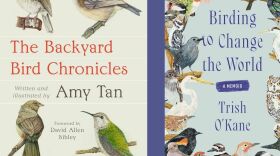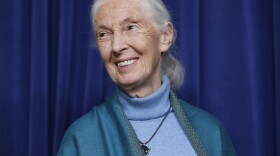Barbara J. King
Barbara J. King is a contributor to the NPR blog 13.7: Cosmos & Culture. She is a Chancellor Professor of Anthropology at the College of William and Mary. With a long-standing research interest in primate behavior and human evolution, King has studied baboon foraging in Kenya and gorilla and bonobo communication at captive facilities in the United States.
Recently, she has taken up writing about animal emotion and cognition more broadly, including in bison, farm animals, elephants and domestic pets, as well as primates.
King's most recent book is How Animals Grieve (University of Chicago Press, 2013). Her article "When Animals Mourn" in the July 2013 Scientific American has been chosen for inclusion in the 2014 anthology The Best American Science and Nature Writing. King reviews non-fiction for the Times Literary Supplement (London) and is at work on a new book about the choices we make in eating other animals. She was awarded a Guggenheim Fellowship for her work in 2002.
-
In his sequel to 'This Day,' Berry’s themes, including bringing alive the joys and sorrows of hard-working rural Kentuckians. are revisited in ways both familiar and fresh.
-
Novelist Amy Tan's The Backyard Bird Chronicles centers on an array of birds that visit her yard, as Trish O'Kane's Birding to Change the World recalls lessons from birds that galvanized her teaching.
-
Here the New York Times columnist and author of Late Migrations and Graceland Margaret Renkl brings alive in 52 chapters her love for the animals and plants in her yard and nearby parks in Tennessee.
-
Activist Greta Thunberg was just 15 when she called on the world to take action on the climate crisis. Just as impressively, she has now pulled together essays by 100 scholars on what's needed now.
-
British paleontologist David Hone set out to write a book that stresses what isn't yet known about dinosaurs — as much as what is known.
-
The primatologist says it's crucial that young people know how positive action can still shift the frightening trajectories of climate crisis, biodiversity loss, and the ongoing global pandemic.
-
Investigative reporter Michael Moss explores how some food companies tweak their products to take advantage of evolved biology, creating room for novelty that triggers the brain to make us want more.
-
Harvard University's Daniel Lieberman looks at exercise from an evolutionary point of view, concluding that we evolved to limit our physical activity where possible, saving it for survival activities.
-
The anthropologist and physician teaches that the world needs not only medicine, but something more — a rejection of global racial inequalities and serious investment in the care of all people.
-
Rebecca Wragg Sykes describes evidence showing that as innovative tool- and fire-makers, Neanderthals adapted to changing climates, adopted symbolic cultural practices and expressed profound emotions.










